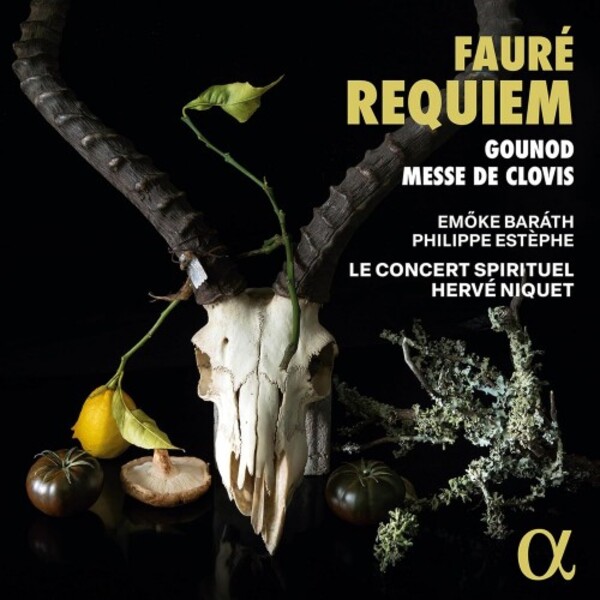FAURÉ Requiem GOUNOD Messe de Clovis (Niquet
View record and artist detailsRecord and Artist Details
Genre:
Vocal
Label: Alpha
Magazine Review Date: 10/2024
Media Format: CD or Download
Media Runtime: 59
Mastering:
DDD
Catalogue Number: ALPHA1014

Tracks:
| Composition | Artist Credit |
|---|---|
| Requiem |
Gabriel Fauré, Composer
(Le) Concert Spirituel Vocal Ensemble Emöke Baráth, Soprano Hervé Niquet, Conductor Philippe Estèphe, Baritone |
| Messe de Clovis |
Charles-François Gounod, Composer
(Le) Concert Spirituel Vocal Ensemble Hervé Niquet, Conductor |
| O salutaris |
Louis (François Marie) Aubert, Composer
(Le) Concert Spirituel Vocal Ensemble Hervé Niquet, Conductor |
| Adagio pour violon et orgue |
André Caplet, Composer
Chouchane Siranossian, Violin François Saint-Yves, Organ |
Author: David Patrick Stearns
Conductors who record Fauré’s Requiem are likely to do so at least twice. Mysteries are few, vocal lines have no Verdi-esque challenges, and there’s definitely not the crossover appeal of Carmina Burana. Yet like many before him, Hervé Niquet is back to the piece only 10 years after his outing with the Flemish Radio Choir with a stance that’s as austere as can be, using the 1893 version with its sombre orchestration – no violins except for incidental solos – made more so (and creating an even more singular timbre) for lack of vibrato. More distinctive is the Gallic enunciation of the Latin text: while no great revelation, it’s good to hear and historically apt. The Vatican’s belief that church Latin should be sung with Italianate rounded vowels took hold only after the Requiem’s composition, and took hold slowly: Nadia Boulanger’s 1948 Paris-made Fauré recording (EMI) has vestiges of the old pronunciation.
With an ensemble of 27 singers and 17 instrumentalists, Niquet’s Le Concert Spirituel lack the weight of modern instruments but there’s no lack of gravitas in the opening musical gestures, which tells you that this Requiem may be lighter than Verdi but is no less serious. The very spareness of the sound world in this recording implies a sense of desolation that comes with grief. The choir does generate extra amplitude when singing ‘Hosanna’ and the ‘Dies irae’, and though the brass are restrained, they’re never airbrushed.
Chouchane Siranossian’s violin solo in the Sanctus has such a clean, vibrato-less sound that it could be mistaken for an other-worldly wind instrument, and one that (like Arvo Pärt) reminds you of the power in radically quiet music. The organ sound is ethereal but precise. Soloists don’t project star quality, though baritone Philippe Estèphe is a model of scrupulous, well-focused singing and soprano Emőke Baráth has a passing resemblance to Victoria de los Ángeles, in both her timbre and her inner conviction. The overall impression: this performance is after essence. The ‘Pie Jesu’ doesn’t try to conjure a cosy, churchy portrait of innocence. It’s a prayer that straightforwardly requests mercy and rest.
Over the course of the piece, however, the detached manner feels more remote and less engaging if only because of its conceptual narrowness. One longs for more emotional underpinning – the hallmark of Philippe Herreweghe’s recent Collegium Vocale Gent recording, which similarly comes from the period-instrument world but maintains a sense of rhetoric associated with the modern-instrument world.
All Fauré Requiem outings contend with the question of viable pairings. Herreweghe has Brahms’s welcome Begräbnisgesang (‘Burial Song’), Op 13 – a funeral processional work with the directness of the composer’s early choral works. Niquet’s previous recording had little-known sacred works by Gounod. This recording mixes the pleasantly arcane O salutaris by Louis Aubert (1877-1968) for soprano, violin, harp, organ and choir and Adagio for violin and organ by André Caplet (1878-1925), both having a more secular sense of lyricism, with Gounod’s late-period Messe de Clovis, dedicated to the famous hero of the Franco-Prussian War. Written near the end of the composer’s life and with little evidence of the Faust composer, the music is built on predominantly chordal word-settings that seem to have been written not so much for a semi-professional church choir but an untrained congregation. Interesting – for a few hearings.
Discover the world's largest classical music catalogue with Presto Music.

Gramophone Digital Club
- Digital Edition
- Digital Archive
- Reviews Database
- Full website access
From £8.75 / month
Subscribe
Gramophone Full Club
- Print Edition
- Digital Edition
- Digital Archive
- Reviews Database
- Full website access
From £11.00 / month
Subscribe
If you are a library, university or other organisation that would be interested in an institutional subscription to Gramophone please click here for further information.




